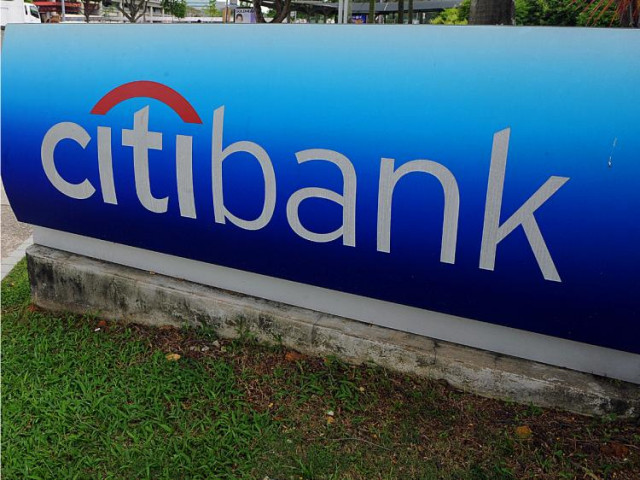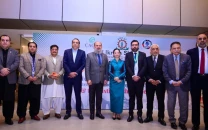End of an era: Citi may finally go to sleep
Citibank to close consumer division as part of global trends.

It is the end of an era, it seems. Citibank, the institution that revolutionised consumer banking in Pakistan and gave it the face that we know today, is shutting down its consumer banking division in Pakistan, according to sources familiar with the matter.
Citigroup officials neither confirmed nor denied the reports and gave a neutral response to The Express Tribune’s request for comment.
“As a matter of policy, we do not comment on market rumours,” said Karim Seifeddine, the chief spokesperson for the Citigroup Middle East and Africa, in an e-mail.
Nevertheless, sources both inside the bank itself as well as the banking industry as a whole, insist that Citi is shutting down its consumer banking division in Pakistan to focus on corporate and institutional clients. The bank has only 11 branches in Pakistan, but has been very successful in developing the consumer banking market in the country and has a very strong presence in the corporate and investment banking space, particularly among clients looking to execute cross-border deals.
“Citi, along with Standard Chartered, is the go-to bank for anyone who wants to execute any kind of large cross-border investment banking transaction in Pakistan,” said one banker based in Karachi who wished to remain anonymous.
But Citigroup’s real contribution to the Pakistani financial services sector was the revolution in consumer banking that it brought about in the early 1990s, when the bank was led by a legendary team that included former Finance Minister Shaukat Tarin.
“We practically invented consumer banking in Pakistan,” said one former member of Tarin’s team at Citibank. “Before us, nobody had heard of a credit card and there was hardly any mortgage or auto financing.”
Citi already exited its consumer lending portfolio by selling off most of its business to a local bank in 2009. It appears that the bank is now looking to cut the final links to the consumer finance
market altogether by selling off its branch network and deposits. It is unclear whether Citibank has yet found a buyer for that network.
As of September 30, 2011 – the latest available figures – Citibank Pakistan had about Rs70 billion in deposits and a total asset book of about Rs96.4 billion ($1.1 billion). Yet the overwhelming bulk of those deposits are large corporations and multinationals.
As for the bank’s lending portfolio, it has become heavily skewed towards government securities with almost half of its assets parked in short and long term treasury bills. Corporate lending accounts for only about 20% of the bank’s total asset book.
The strategy has been remarkably profitable for Citibank, which has seen its net income jump 391% to reach Rs1.7 billion for the first nine months of 2011, compared to the same period in the previous year. The bank is on target to beat its nominal record earnings of Rs2 billion that it achieved in 2004.
Yet it appears that the bank sees no real growth prospects in the Pakistani market for itself. Standard Chartered has all but cornered the market for multinational corporations and large local companies, the bread and butter of Citi’s corporate clientele in the past.
Citibank also appears to have lost a lot of interest in its international retail banking and has been cutting back its global branch network for the past five years. In 2008, for instance, the bank sold off its 340 branches in Germany for €5.2 billion ($7.7 billion) to France’s Credit Mutuel. Even that division had been highly profitable, earning $573.3 million in 2007 off an asset base of $1.5 billion.
The bankers at Standard Chartered are likely to be excited at the news that Citibank is closing off its retail business. While Citi may plan on retaining much of its corporate clients, a significant number of them are nonetheless expected to migrate to Standard Chartered, the bank that has been operating in what is now Pakistan since 1863 and does not seem to have any intention of leaving any time soon.
Standard Chartered seems to finally be reaping the benefits of having acquired Union Bank in 2006, which has given it a larger local branch network than any other foreign bank in the country. As a result of that acquisition, it also became the only foreign bank to be listed on the Karachi Stock Exchange.
“It is essentially a ‘local’ foreign bank,” said one finance professional in Karachi who wished to remain anonymous.
Standard Chartered has a large branch network that allows it to sustain a presence in the Pakistani market independent of any international business it might get through referrals from its offices in London, Hong Kong or New York. Sources inside the bank say it has quietly become the bank of choice for international corporations looking to do deals in Pakistan, largely because it has a large enough presence to execute complex transactions.
Citibank, HSBC and JPMorgan all have investment banking divisions in Pakistan, but are very small – and have even smaller asset books to back them up. By contrast, Standard Chartered has Rs353 billion in assets and over 200 branches in Pakistan.
Published in The Express Tribune, March 17th, 2012.



















COMMENTS
Comments are moderated and generally will be posted if they are on-topic and not abusive.
For more information, please see our Comments FAQ